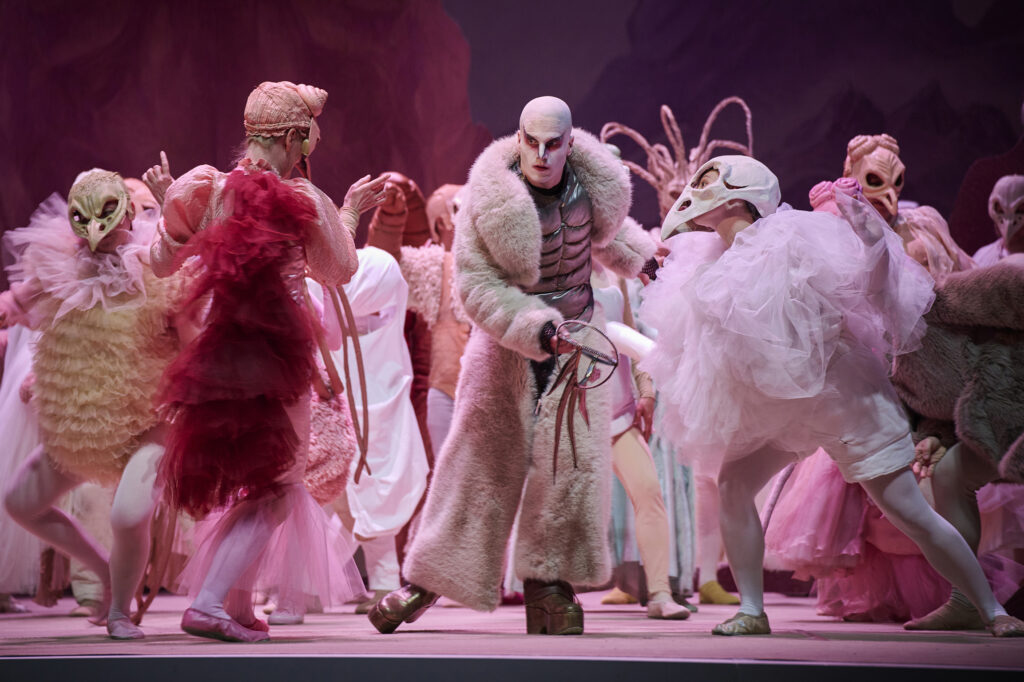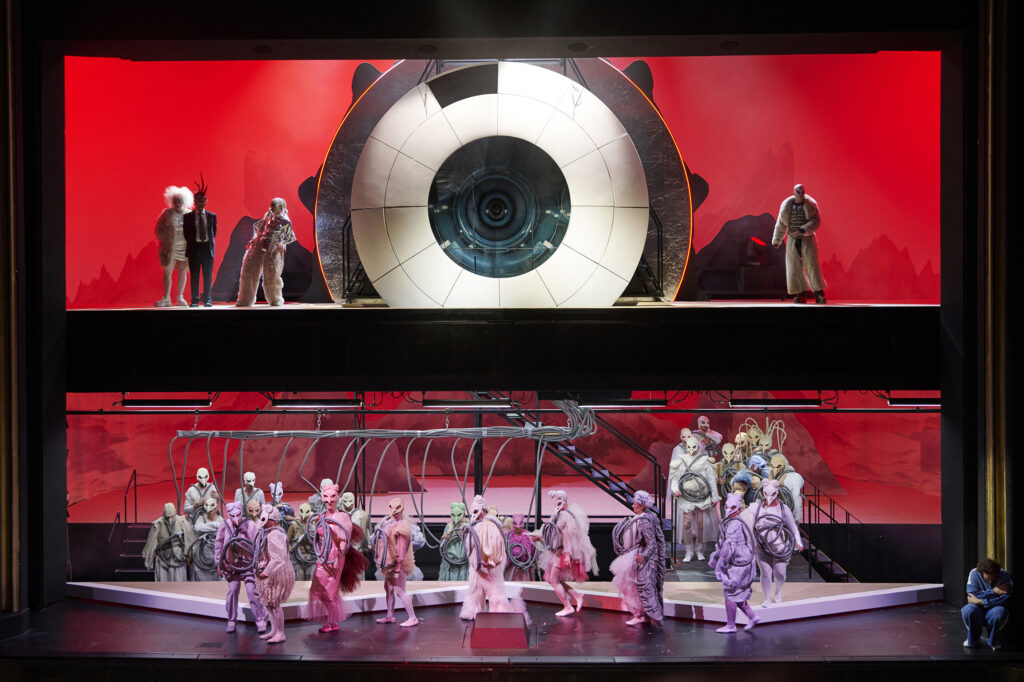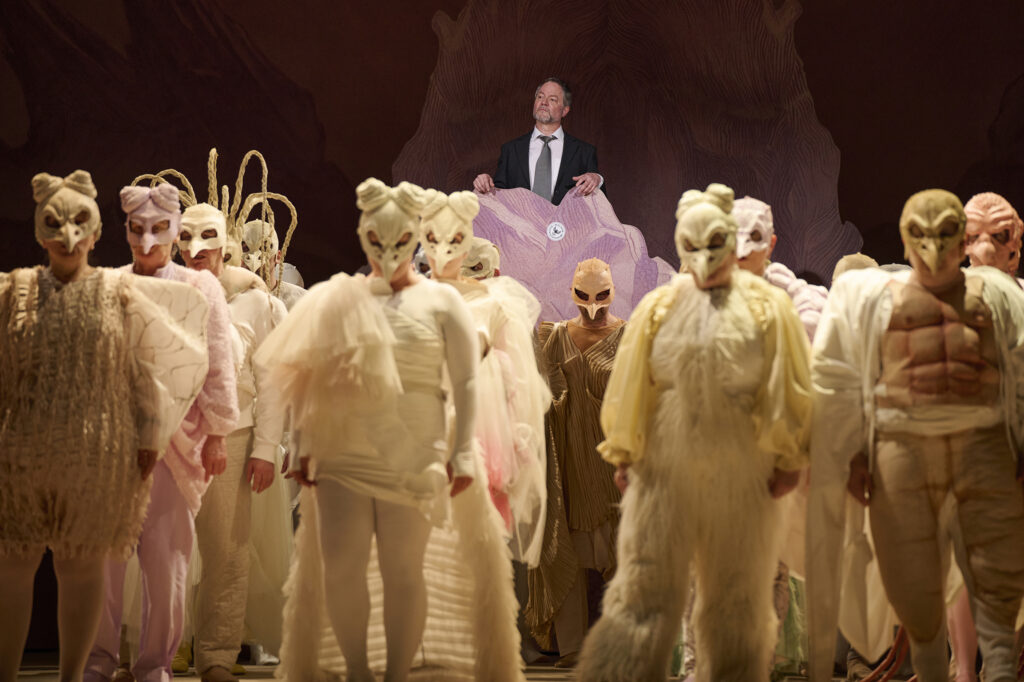Parable in pastel: Kerstin Steeb keeps all options open in her new production of Walter Braunfels’ “Birds” for the Staatstheater Braunschweig. Srba Dinić conducts the Staatsorchester attentively and mostly precisely through the highly romantic score.
Fables from the animal world actually put their finger in the wound. That is the purpose of their existence, to show the audience current grievances, injustices and mistakes through the lens of allegory. Walter Braunfels did this between 1913 and 1919 with his treatment of Aristophanes’ ancient comedy “The Birds”. In the case of the ancient Greek, the occasion is the increasingly imperialistic and militaristic behaviour of Athens that drives his ‘Birds’, while Braunfels’ approach, as a mirror of its time, also shows the German path to the fascist ruin of the Third Reich. In the case of the ancient Greek, the occasion is the increasingly imperialistic and militaristic behaviour of Athens that drives his ‘Birds’, while Braunfels’ approach, as a mirror of its time, also shows the German path to the fascist ruin of the Third Reich.

The director hardly cares, as Kerstin Steeb has decided against swastikas on stage with poetic images in pastel colours (stage and costumes by Jan Hendrik Neidert, Lorena Dias Stephens). Which, in principle, wouldn’t do any harm, as it preserves the character of the animal parable with a wonderfully pretty poultry chorus in Cloud Cuckoo Land. In addition, the original (Braunfels had converted from Protestantism to Catholicism) also omits the revolt, with everyone united under the god Zeus at the end.
If the original itself only very tamely puts its finger in the wound, the director could certainly take a clear position here and take a stand. But this is avoided – a glance at the programme helps and amazes: ‘At a time when theatres are facing more and more political (legitimisation) pressure’, this is ‘why’ the ‘theatrical means are used quite openly’. And so what is actually a beautifully poetic production takes on a stale flavour. One can wonder whether the lack of positioning and differentiation from Ratefreund’s world of thought could be at least opportunistic, if not even compatible with totalitarian structures, to which the composer himself fell victim (the National Socialists banned him from performing in 1933). In any case, Braunfels was asked by Adolf Hitler in 1923 whether he would like to compose an anthem for the NSDAP. He declined. Hitler obviously had no problems with the intention of the play. What would have happened if Braunfels had accepted remains speculative, of course, but the prompt ban on performances immediately after the seizure of power in 1933 seems like a tit-for-tat.
Hoffegut, a dreamer in jogging trousers and jacket with a Staatstheater advertising bag in his hand, accompanies the main character Ratefreund (Michael Mrosek with a precise, expressive baritone) on his way from the human audience rows to the realm of the birds. Mirko Roschkowski sings this with a wonderfully finely nuanced, lyrical touch and flowing intonation. He is only quite at ease in the airy world of the Nightingale (Ekaterina Kudryavtseva with an expressive, pithy and dramatically clear soprano), and so the long duet between the two – in keeping with the text (‘Slurp this scent’ of ‘unprecedented sweetness’) – emits the sweet-smelling perfume ‘Narcotics’ into the auditorium.

After the interval, a futuristic sci-fi eye from ‘Star Wars’ takes over the stage: the eye of Zeus warns, and Prometheus (Johannes Schwärsky with a confident, precise and well-shaped bass-baritone) emerges from the prompter’s box as a Deus-ex-Machina stagehand. Seduced by his friend, the bird choir (beautifully and vividly rehearsed by Johanna Motter) hangs from the supply lines in the Zeus mast. Increasingly, however, disappointment spreads over the hollow promises of building a city of birds that Ratefreund has promised the plumage around the hoopoe leader (Maximilian Krummen with balsamically flowing intonation, very easy to understand and great acting).

Isabel Stüber Malagamba has completely internalised her role as the first thrush: wonderfully jerking and twitching, strutting and stalking, turning and scratching in her playing, yet warm-toned and precisely flowing in her singing, she gives a wonderful performance.
The other birds are also real turkeys, who make a lively flock of birds with beak masks and lowered knickers (Galina Benevich as Zaunschlüpfer with an expressive performance).
At the end, the stage backdrop opens up and the birds take off their feathered costumes. Disillusionment, becoming human? That remains open. But the nightingale remains as a warning caller in the darkness.
In the pit, Srba Dinić shapes the profound, highly Romantic music with a certain colourfulness and beautifully played-out plasticity, which in some places is very reminiscent of the lines and driving, jubilant arches of his contemporary Richard Strauss. Braunfels nevertheless develops his own independent tonal language, which at times does not take itself so heroically, but rather not so seriously with an ironically lighter focus. This is convincing, especially as the Braunschweig GMD conducts with a penchant for the big tableau, but also supports and carries the singers in beautiful alternations.
Much applause for all involved.